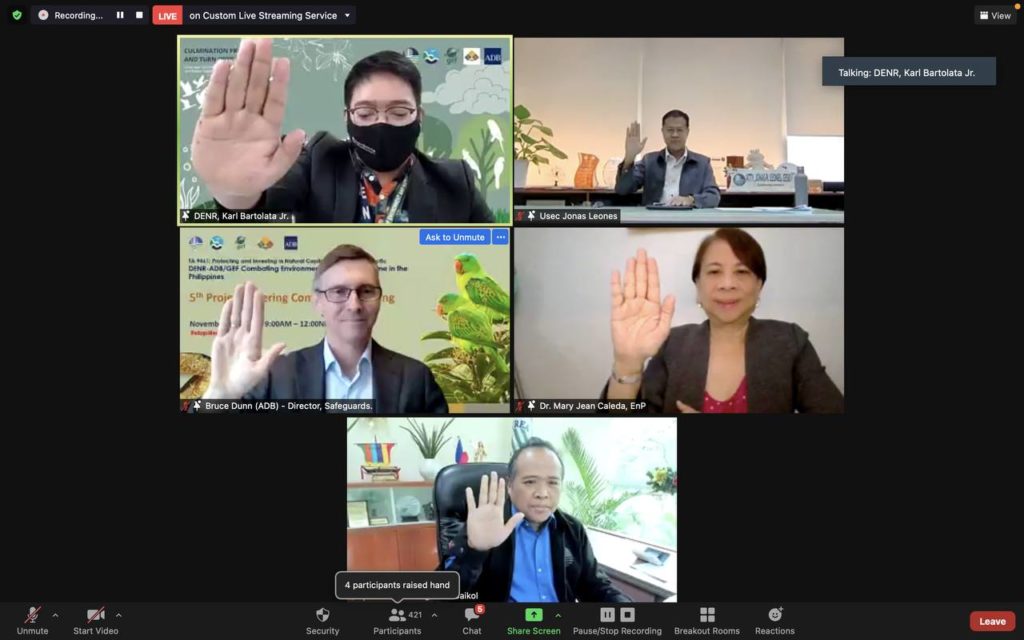The Department of Environment and Natural Resources – Biodiversity Management Bureau (DENR-BMB) during its Third National Wildlife Law Enforcement Summit held online last November 16-18, 2021 appealed to the public to support the government’s drive against illegal wildlife trade (IWT), emphasizing its links to the health and economic stability of Filipinos.
“These diseases emerge not because of the existence of wildlife, but because of people who exploit wildlife. Our own survival as a species is at stake and everyone has a role in combating illegal wildlife trade,” said DENR-BMB Director Datu Tungko M. Saikol during the Culmination Programme and Turn-over Ceremony of the DENR-Asian Development Bank (ADB)/Global Environmental Facility (GEF) Combating Environmental Organized Crime Project held on the third day of the said Summit.

Saikol said that the COVID-19 pandemic proved that public health could be adversely affected by zoonotic diseases emerging from contact with wildlife, or infectious diseases transmitted from animals to humans. In 2020, the United Nations Office on Drugs and Crime (UNODC) World Wildlife Crime Report indicated that zoonotic diseases represent up to 75 per cent of all emerging infectious diseases. As hunters, middlemen, and consumers come in close contact with wild animals at different points of the trade, they can contract novel, unknown diseases and pass these on to other humans. “The pandemic is a wake-up call for us to avoid colliding head on with nature, a call to protect our natural resources and the health of millions,” he added.
Committee on Environment, Natural Resources and Climate Change Chairperson Senator Cynthia Villar, for her part, said that there is a need to be proactive when it comes to wildlife protection. “It is the constant exploitation of wild animals and their habitat, mostly through human actions, that drives the risk of zoonotic diseases’ transmission,” she said in a recorded message to the participants of the Summit.
Saikol also sought the public’s involvement against IWT for economic reasons. “Conserving and protecting our biodiversity creates jobs, supports local businesses and tourism, and increases local tax revenue. It is common-sense economics,” he said. The DENR estimates that IWT costs the Philippines 50 billion pesos every year, covering the market value of wildlife, poaching-related damage to habitats, and loss of ecotourism revenue.
The DENR-BMB urged the public to report alleged IWT crimes through DENR’s social media accounts or to the nearest DENR regional offices. “The DENR cannot do this alone,” Saikol said. “We need the public to act as eyes and ears in their communities and help report wildlife violations,” he added.
Forest rangers and law enforcement partners can use the WildALERT mobile application to report suspected illegal wildlife trafficking. The WildALERT- Fauna app was initially developed with the support of USAID-PROTECT Wildlife but was later expanded to include the flora component, with support from the DENR-ADB/GEF Project.
The Project also collaborated with the DENR-BMB in producing video documentaries and other communication, education, and public awareness materials, including posters in Tagalog and Bisaya, to further engage the public on the issue.
“Addressing illegal wildlife trade is of primary importance,” said DENR Undersecretary for Protected Areas and Special Concerns Edilberto Leonardo. “We continuously strive to equip people to be environmental defenders,” he added.
“Filipinos must stop buying illegal wildlife, their by-products, and derivatives. The IWT runs on greed and profits. Without the demand for illegal wildlife, the trade will dry up,” Saikol said.
As one of the world’s most mega-diverse countries, the Philippines is an important source, transit, and destination point for illegal wildlife trade, which is now the fourth largest illicit trade worldwide behind illegal drugs, arms, and human trafficking.
“Wildlife law enforcement may be the mandate of the DENR, but helping stop illegal wildlife trade and conserve our biodiversity is every Filipino’s responsibility,” Saikol concluded.